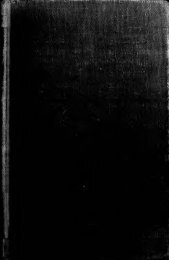Ecclesiastes - GA Barton - 1908.pdf
Ecclesiastes - GA Barton - 1908.pdf
Ecclesiastes - GA Barton - 1908.pdf
Create successful ePaper yourself
Turn your PDF publications into a flip-book with our unique Google optimized e-Paper software.
84<br />
ECCLESIASTES<br />
toils with so much care should go into the possession of one who<br />
has never worked for it at all. 22. What shall be to a man], as Gins,<br />
suggests, this corresponds to "what advantage to a man," of<br />
ch. i 3 . The thought has nearly completed a great cycle, and<br />
Qoheleth now comes back to sum up his reasons for pessimism.<br />
23. All his days are pains]. This verse echoes the experi-<br />
ence of those who follow pursuits which cannot satisfy the heart.<br />
They obtain no real pleasure even in the performance of their<br />
chosen occupations. One phrase of it "his days are pain" is<br />
in substance quoted and opposed in Wisd. 2 1 . 24, 25. There is<br />
nothing better for a man]. The rendering of these verses given<br />
above rests on an emended text, the authority for which is given<br />
in the critical notes below. Qoheleth here states the conclusions<br />
to which his various investigations had led. The best thing for<br />
man is to get the most physical pleasure he can out of life. This<br />
is not stated from the Epicurean standpoint, but from the point<br />
of view of Hebrew monotheism. Qoheleth, as a Hebrew, believes<br />
that this would not be the order of life, if God had not so ordained<br />
it. The sentiment of this verse is quoted and denied in Wisd. 2 6 .<br />
26 a . To a man who is good He gives wisdom]. Recent interpreters<br />
have, with some differences in detail, regarded the verse as a<br />
gloss; so Wild., Sieg., McN., and Ha. Sieg.<br />
and McN. divide it<br />
into two glosses, regarding: "This also is vanity and a desire of<br />
wind," as a touch of a late hand. That the verse with the exception<br />
of the last clause is the work of a Chasid glossator, must be<br />
granted. It contradicts Q.'s fundamental philosophy. The<br />
doctrine that all the good things of life come to the morally good,<br />
finds expression in many parts of the OT., and the thought that<br />
the good finally receive the fruits of the toil of the wicked is also<br />
not lacking (cf. Job 27" Pr. 13" 28*). Such a cheerful view of<br />
the moral order of the universe is, however, totally opposed to<br />
Q.'s whole thought, and justifies us in seeing here the work of<br />
another hand. I cannot agree with Sieg. and McN., though, in<br />
seeing the hand of an annotator in the last clause. If it originally<br />
followed vs. 25, it expressed, as pointed out above, an intelligible<br />
thought, and one thoroughly consonant with Q.'s point of view.<br />
26 b . Desire of wind} originally followed vs. 25. Q.'s declaration





